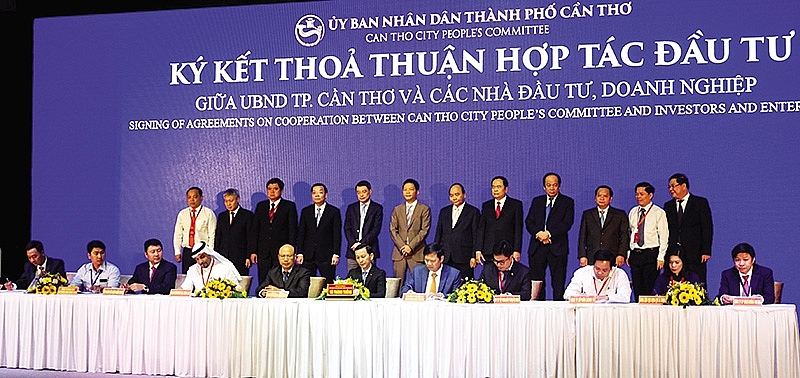Can Tho a major investment magnet
 |
| Can Tho signed important agreements with investors at its investment promotion conference in August |
Due to this newfound status, Can Tho has also been named among the localities pioneering the attraction of new foreign direct investment.
Shortly after the Law on Foreign Investment came into force, in 1988 the former province of Hau Giang licensed a project on founding Meko joint venture, which consisted of a string of factories to operate in diverse fields of apparel production, food and agricultural item processing, and animal feed production. After this initially encouraging development, the FDI flow into Can Tho saw a halt over several successive years due to a combination of factors, with the main cause being the limitations related to transport infrastructure in Can Tho in particular and the Mekong Delta region in general.
Aware of this bottleneck, the government has focused investment into upgrading and expanding technical infrastructure system in the Mekong Delta in recent years.
Investment was put into executing a raft of projects of national significance in Can Tho, such as Can Tho International Airport, Can Tho Bridge, Cai Cui Port, South Song Hau Road, and the O Mon thermal power centre.
The constantly improving technical infrastructure network ensuring convenient road and waterway transport, paired with the presence of seaports and an international airport as well as more highly developed logistics services, has enabled Can Tho to grow into one of the major import-export hubs in the country, with convenient connections to other localities in the region and the country.
This has provided the catalyst to turn Can Tho into a major economic centre in the Mekong Delta, while also providing enormous opportunities for the city to woo investment.
A watershed in FDI attraction to Can Tho was marked in 2016, when the city licensed a sizable foreign-invested project registered to invest in Hung Phu Industrial Zone (IZ).
The project involved construction and development of IZ infrastructure and the construction of a sports shoes production factory for South Korea’s Tae Kwang Industrial Co., Ltd. at Hung Phu 2B IZ in Cai Rang district.
It covers 62 hectares of space in the IZ, 52ha of which are earmarked for building the shoe factory and the remaining area for associated service facilities including warehouses for rent, with total investment capital reaching $171.4 million. Many of local and foreign investors have come to Can Tho in search of co-operation and investment opportunities across the board. Projects valued at several billion dollars have received investment certificates in the city.
As part of Can Tho’s investment promotion conference, which took place in August 2018, 10 projects valued at VND8 trillion ($354 million) received investment certificates and investment approval. In addition, the Can Tho People’s Committee and investors signed co-operative agreements for 19 projects capitalised at nearly VND85 trillion ($3.76 billion).
Can Tho’s appeal to investors will be ramped up in the near future after Trung Luong-My Thuan-Can Tho Expressway is opened to traffic. After the expressway is put into use, travel time from Ho Chi Minh City to Can Tho will be cut down by half, from the current three hours to 90 minutes. The project to build an express train route from Ho Chi Minh City to Can Tho, which is set to cross Ho Chi Minh City, Long An, Tien Giang, Vinh Long, and Can Tho, at the cost of $5 billion, is now in the legal setup phase.
What the stars mean:
★ Poor ★ ★ Promising ★★★ Good ★★★★ Very good ★★★★★ Exceptional
 Tag:
Tag:
Related Contents
Latest News
More News
- NAB Innovation Centre underscores Vietnam’s appeal for tech investment (January 30, 2026 | 11:16)
- Vietnam moves towards market-based fuel management with E10 rollout (January 30, 2026 | 11:10)
- Vietnam startup funding enters a period of capital reset (January 30, 2026 | 11:06)
- Vietnam strengthens public debt management with World Bank and IMF (January 30, 2026 | 11:00)
- PM inspects APEC 2027 project progress in An Giang province (January 29, 2026 | 09:00)
- Vietnam among the world’s top 15 trading nations (January 28, 2026 | 17:12)
- Vietnam accelerates preparations for arbitration centre linked to new financial hub (January 28, 2026 | 17:09)
- Vietnam's IPO market on recovery trajectory (January 28, 2026 | 17:04)
- Digital economy takes centre stage in Vietnam’s new growth model (January 28, 2026 | 11:43)
- EU Council president to visit Vietnam amid partnership upgrade (January 28, 2026 | 11:00)






















 Mobile Version
Mobile Version